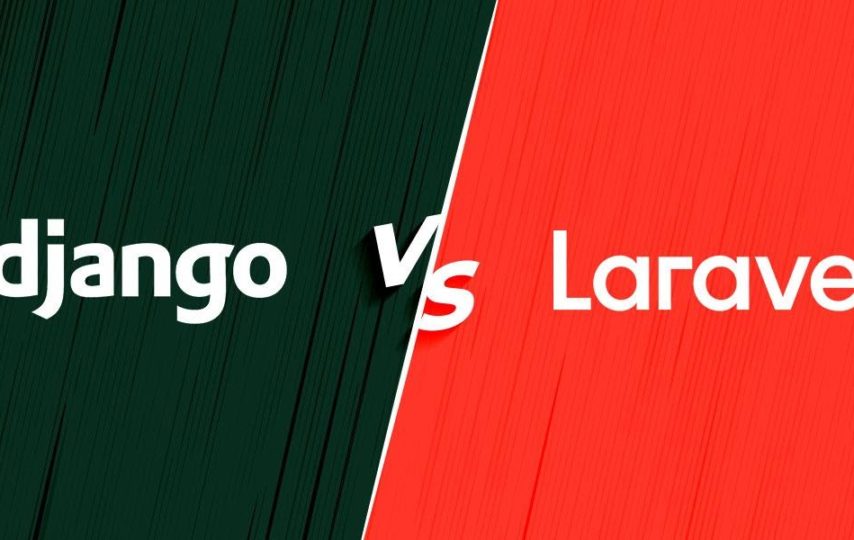Developing websites can be a quite complex and hectic task. To make this job simpler and easier, there are several resources, or web development frameworks that are available to aid in this process. They consist of several templates. These provide necessary information on web development to the developers. They create a suitable environment for programming, Application Programming Interfaces, or APIs and services that are an essential need in building content management systems. In this article, we take into account two such web development frameworks, Django and Laravel. Thereafter we will compare and contrast their pros and cons and decide which one is better and more ideal for web development.
What is Django?
Django is a top-level Python web backend framework that incentives fast development and distinct practical designs. It follows the model-template-view (MVC) architectural pattern. It is a web development and app building framework, engineered by a team of skilled developers. It takes much of a load of web development so that the users can focus on building their app without having to worry much about re-inventing the wheel. Launched in 2005, Django is a free and open-source web development backend framework. Django Software Foundation, a non-profit independent American organization owns and maintains the framework. The main aim behind building Django is to help in the development of intricate, database-controlled websites. Python is the main coding language used all over, even for settings, files, and data models.
Several big-shot companies use the Django framework to build their websites and applications. Some of these popular, well-known companies include Instagram, Mozilla, Pinterest, and many more. The entire goal of the Django framework is to deconstruct and simplify the process of developing websites and make it much less time consuming and hectic. For this reason, most of the small companies and startups favor the Django web development framework.
What is Laravel?
Just like Django, Laravel is another web application framework that contains meaningful and eloquent syntax. Built by Taylor Otwell in 2011, it is also a free and open-source PHP framework. The main goal of Laravel lies in the aid of the development of web applications that follow the model-view-controller or MVC building pattern based on Symfony. GitHub hosts the source code of this web application developing framework.
The backend framework offers several attractive features including a modular packaging system with a committed dependency manager. Besides, it has a variety of ways that helps the users access relational databases, application deployment, and maintenance utilities with its inclination towards syntactic sugar.
Laravel is one of the most well-known web development frameworks in the development community. Websites like 9Gag and UNION use its backend framework.
Pros and Cons of Django Framework
Pros:
Speed: One of the main and probably the biggest advantages of Django is that it helps app developers to build their apps at a quick pace and effectively. If you have met deadlines while launching your application, Django is your best option.
Security: Django leaves no stones unturned when it comes to making mistakes on security breaches or compromises by the developers. By using Django, developers can avoid making mistakes like SQL injection, clickjacking, cross-site request forgery, and so on.
Scalability: If your website or app attracts heavy traffic, Django is the way to go. Owing to its scalability feature, it has now become much easier to control and manage overflowing traffic.
Cons:
Django is mainly used for developing big websites and intricate apps. It can cause some problems when it comes to building smaller websites and less complicated applications.
Routing becomes difficult when the developer is using Django to create his or her app.
Another common flaw in this framework is that it provides no notifications or warning alerts if there are any errors in templates.
Pros and Cons of Laravel Web Development Framework
Pros:
Minimum Learning Curve: The most prominent feature of the Laravel web development framework which makes it so popular is that it is easier to learn and master than other frameworks. It is widely popular among the developer community and its documentation is easy to understand and simple for beginner developers and rookies in this medium. Because of this sole reason, there are lots of Laravel based developers who are ready for hire.
Artisan: Laravel consists of Artisan CLI that helps developers to effectively develop command-line applications. It has a plethora of advanced tools and functions that aid developers in performing different tasks and migrations.
The Latest PHP Features: Unlike other frameworks, Laravel is quite updated with PHP features making it a strong point of this web development tool. You have access to some latest features like Interfaces, Namespaces, Anonymous functions, and Overloading with Laravel 5.
Cons:
The main feature that Laravel lacks is the payment feature.
The upgrading from Laravel 5 to Laravel 4 is not an easy task. It is not so seamless which means that your application has the possibility of breaking while updating your code.
Another disadvantage of Laravel is that it may not always offer 100% mobile richness.
So Which Is Better? Django or Laravel?
● Laravel is the framework behind the Top 10K Sites, the Top 100K Sites, the Top 1M Sites, and the entirety of the web.
● Whereas Django has grown in recent years, but still is lagging behind Laravel in the major market share sections.
● Laravel has a better share in its user coverage includes websites that specialize in computers, electronics and technology, arts and entertainment, business and consumer services, finances, and 16 other categories.
● However, when it comes to website categories like science and education, food and drink, hobbies, and leisure and reference materials, Django is the leading development framework.
The Differences In Features
When it comes to features, the Laravel framework is ahead of Django.
For example, Django has problematic routing features as there is no built-in mechanism to develop an API. On the other hand, routing becomes simpler in Laravel as developing an API is much easier.
Besides this, a website created by using Laravel is much faster compared to one built using the Django framework. Laravel also offers in-house support. It also supports SASL, cache backends, and other features.
Reading the article you can already deduce that both the frameworks have their own set of advantages and disadvantages. But compared to the Django framework, Laravel is relatively a better an more ideal option for app development as it makes the creation of intricate and complex websites and web applications much simpler and less time-consuming.
Also because it is easy to learn, you spend a lot less time in in-house learning than hiring a Laravel developer.
However, it should be kept in mind that no development framework is impeccable and perfect. The use of each of these development frameworks depends on the kind of project that is being engineered. So if you are using Django to create something casual or lightweight you will not experience its full potential and impact. Choosing the right framework for your project is the only way to increase the effectiveness of these frameworks.
Now it is up to you to select the most suitable framework as per the requirements of your project.
Author Bio: Dilip Tiwari is an SEO Expert at Universal Stream Solution. Universal Stream Solution is a web development company in Atlanta. That helps startups to enterprise companies in mobile & web technology.








